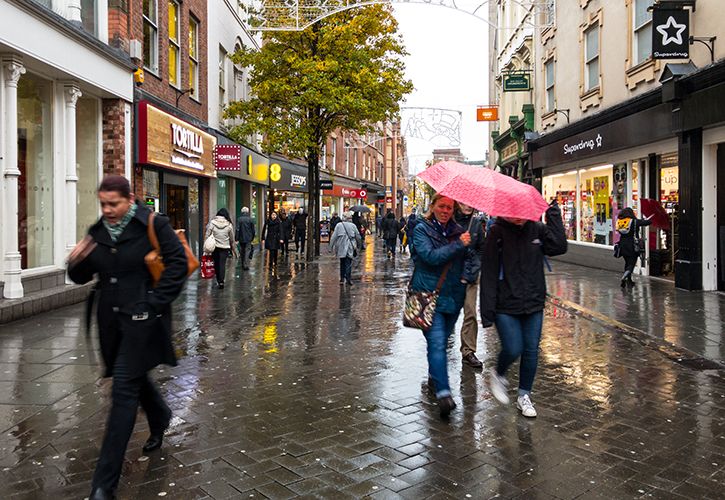UK DIY News
Wet Weather Contributes To Flat February Retail Sales

The ONS has published retail sales data for February, covering the period 28 January 2024 to 24 February 2024.
- Retail sales volumes (quantity bought) were estimated to be flat (0.0%) in February 2024, following an increase of 3.6% in January 2024 (revised from an increase of 3.4%).
- Sales volumes in clothing and department stores grew because of new collections but falls in food stores and fuel retailers offset this growth. Meanwhile online sales increased, particularly for clothing retailers, as wet weather affected footfall.
- More broadly, sales volumes fell by 0.4% in the three months to February 2024 when compared with the previous three months, and by 1.0% when compared with the three months to February 2023.
- February 2024 was a steadier month as sales values (amount spent) fell marginally by 0.1%, alongside unchanged volumes. However, volumes fell 0.4% over the year and remained 1.3% below their pre-coronavirus (COVID-19) pandemic level in February 2020.
- Non-food stores sales volumes (the total of department, clothing, household and other non-food stores) rose by 0.7% over the month to February 2024, but fell 0.5% over the year.
- Most of the increase within non-food stores was because of a monthly rise of 1.7% within clothing stores, following recent monthly falls. Retailers reported that new collections and promotions contributed to this rise.
- Sales volumes at department stores and other non-food stores also grew over the month (by 1.6% and 0.4%, respectively). However, household goods stores fell by 1.0% with respondents reporting the economic climate and poor weather as factors that contributed to the fall.
- The Met Office climate summaries reported a mild but wet February 2024 with generally unsettled weather. Southern England received 239% of its average rainfall and in this area, it was the wettest February on record (from 1836).
- Food stores sales volumes fell by 0.3% over the month following January's recovery from December's record fall in 2023. Respondents again reported poor weather leading to a reduction in footfall, consistent with footfall measures in our Economic activity and social change in the UK, real-time indicators bulletin.
- Automotive fuel sales volumes fell by 1.3% over the month to February 2024 as fuel prices increased slightly.
Online shopping
- The amount spent online, known as online spending values, rose by 2.1% over the month to February 2024 (2.2% over the year). This monthly rise was the largest since July 2023 when shoppers switched to online shopping because of poor weather and increased promotions.
- Clothing retailers reported strong online sales while department stores and household goods stores were the only two subsectors where sales values fell over the month.
- This monthly increase in online sales led to a rise in the proportion of sales made online, from 25.1% in January 2024 to 25.7% in February 2024.
Commentary
British Retail Consortium
Responding to the latest ONS Retail Sales Index figures, which showed sales up 3.1% by value, and down 0.5% by volume, Kris Hamer, Director of Insight at the British Retail Consortium, said:
"February sales were hit by the wettest February on record, which dampened demand and depressed footfall. This was felt most in the more high-ticket categories such as furniture and electricals. Meanwhile, cosmetics and toiletries continued to sell well as popular brands go from strength to strength. Retailers are hopeful that with warmer weather and potential interest rate cuts around the corner, consumer confidence will soon spring back.
"A strong retail industry is essential for boosting investment in town and city centres nationwide. The next Government must address the high and rising cost burdens that retailers face, now and in the future; these include April’s 6.7% business rates rise, ill-thought-out recycling proposals, and new border control costs – all in the context of the largest rise to National Living Wage on record. Without action, these costs continue to hold back investment in shops, in more jobs and lower prices across the country - meaning it is the consumers who ultimately pay the price."
PwC
Lisa Hooker, Leader of Industry for Consumer Markets comments on the ONS retail sales figures for February 2024:
"Little surprise that retail sales were unable to continue the momentum of the apparent bounceback witnessed in January’s numbers following a lacklustre Christmas. Headline retail sales for February were flat compared with January in volume terms, and still 1.3% below pre-pandemic levels, while pounds in the till continued to be flattered by inflation, albeit to a lesser extent as CPI fell to 3.4%.
"Grocery sales slowed slightly from the previous month’s highs, as more people ventured back to eating and drinking out after Dry January. Meanwhile the wetter and milder February also helped clothing retail sales growth with new season’s stock doing particularly well. Fashion, along with health & beauty, has proven to be consistently one of the more resilient categories in recent months, as disposable income has been diverted from categories such as home and DIY which are traditionally stronger at the start of the year. Albeit all categories are seeing increased volatility of performance week on week.
"The wetter weather also helped online growth, with penetration increasing to 25.7% from January’s now re-stated low of 25.1%. After the post-pandemic normalisation of online sales. This suggests that online is now back to the relative long-term growth trend that has driven the net closure of retail outlets we uncovered in our most recent store openings and closures research.
"Overall, February’s retail sales figures confirm that, despite falling inflation, a 2% cut in national insurance at the start of 2024, and improving consumer confidence in their personal finances, shoppers are still hesitant to part with their hard-earned cash.
"With inflation forecast to fall to the Bank of England’s 2% target in April, in addition to a 9.8% rise in National Living Wage and a further 2% cut to national insurance, retailers will be hoping that the Spring brings green shoots after a challenging last 18 months."
Source : ONS, BRC, PwC
Image : Jason Batterham / Shutterstock.com / 671551474
Insight provides a host of information I need on many of our company’s largest customers. I use this information regularly with my team, both at a local level as well as with our other international operations. It’s extremely useful when sharing market intelligence information with our corporate office.











































